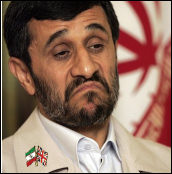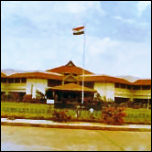 As we slide into the slow news cycle that accompanies the dog days of August, our lives have been brightened, just a little bit, by DIVSYS International, which offers up for this blog and the entertainment of its readers an announcement of its ITAR registration. Another in a long series of exaggerated press releases on ITAR registration, DIVSYS wants everyone to know that it “earns” the registration, as if some test were required rather than merely filling out the form and sending the check to DDTC. DIVSYS was informed of the registration in an “approval letter” and now has been “entrusted” by DDTC with registration. Well, at least the company didn’t say it had been “certified” by DDTC as ITAR compliant.
As we slide into the slow news cycle that accompanies the dog days of August, our lives have been brightened, just a little bit, by DIVSYS International, which offers up for this blog and the entertainment of its readers an announcement of its ITAR registration. Another in a long series of exaggerated press releases on ITAR registration, DIVSYS wants everyone to know that it “earns” the registration, as if some test were required rather than merely filling out the form and sending the check to DDTC. DIVSYS was informed of the registration in an “approval letter” and now has been “entrusted” by DDTC with registration. Well, at least the company didn’t say it had been “certified” by DDTC as ITAR compliant.
Archive for August, 2011
11
Getting Your Money’s Worth Out of ITAR Registration
 Posted by Clif Burns at 6:10 pm on August 11, 2011
Posted by Clif Burns at 6:10 pm on August 11, 2011 Category: Part 122
Category: Part 122
 Permalink
Permalink  Comments Off on Getting Your Money’s Worth Out of ITAR Registration
Comments Off on Getting Your Money’s Worth Out of ITAR Registration Copyright © 2011 Clif Burns. All Rights Reserved.
(No republication, syndication or use permitted without my consent.)
9
Are You Now, or Have You Ever Been, a Spy?
 Posted by Clif Burns at 5:00 pm on August 9, 2011
Posted by Clif Burns at 5:00 pm on August 9, 2011 Category: DDTC • Deemed Exports • Technical Data Export
Category: DDTC • Deemed Exports • Technical Data Export
 With the August 15 implementation date for the new dual and third country national rule fast approaching, I wanted to comment briefly on the Sample Questionnaire that the Directorate of Defense Trade Controls (“DDTC”) has proposed as an example of something foreign companies should use to review whether a dual or third-country national has “substantive contacts” with other countries. Under the new rule, foreign companies covered by a technical assistance agreement (“TAA”) can share technical data with full-time employees who are also nationals of countries other than the company receiving the data under the TAA. One of the conditions, however, for using that rule is that the foreign licensee must examine the “substantive contacts” of that third-country or dual national with other countries to determine whether there is a risk of diversion of the technical data outside the home country of the foreign licensee.
With the August 15 implementation date for the new dual and third country national rule fast approaching, I wanted to comment briefly on the Sample Questionnaire that the Directorate of Defense Trade Controls (“DDTC”) has proposed as an example of something foreign companies should use to review whether a dual or third-country national has “substantive contacts” with other countries. Under the new rule, foreign companies covered by a technical assistance agreement (“TAA”) can share technical data with full-time employees who are also nationals of countries other than the company receiving the data under the TAA. One of the conditions, however, for using that rule is that the foreign licensee must examine the “substantive contacts” of that third-country or dual national with other countries to determine whether there is a risk of diversion of the technical data outside the home country of the foreign licensee.
The sample questionnaire proposed by DDTC represents the agency’s suggestion as to one way that such screening should take place. Some of the questions are poorly drafted, and many of the others are just plain silly and can be roughly paraphrased as simply asking the person involved whether or not he or she is a foreign spy — as if they would answer that question truthfully if they were.
In the poor drafting category, we have this question:
Do you have business contacts, business partners, business contracts, brokers, or any other relationship with a business in another country or other countries subject to U.S. or U.N. embargo?
Because the question as to whether there are contacts with “another country” would necessarily include countries subject to embargo, the final clause is unnecessary and potentially confusing.
Also in the poorly drafted category, we have this incredibly broad inquiry:
Have you ever served in or provided information to the government of another country (e.g., military, foreign ministry, intelligence agency or law enforcement)?
Anybody who has ever traveled to a foreign country would have to answer this affirmatively because of the requirement to provide information to customs and immigration officials upon entry in to the country. And, of course, a third country national will have provided tons of information to his home country government in terms of tax returns, driver’s license applications, and the like. And what about state-owned enterprises? Does information provided to them constitute information provided to the government?
Then we have the “are you a spy” questions:
Do you have contacts with any other individuals or groups involved in acquiring controlled defense articles, including technical data, illegally or otherwise circumventing export control laws? Please explain the nature of that contact.
Do you have contacts with agents from another country or another country’s government?
Do you have contacts with agents from another country or another country’s government?
It is a little known historical fact that Mata Hari, when asked questions of these sorts, broke down into tears, confessed to the French government that she was a spy and asked to be immediately taken to the firing squad for execution.
The questionnaire also has the dual or third country national attest that he or she has given the company complete and accurate “social networking addresses.” Apparently whoever wrote this had heard that all the kids these days do these Twitter and Facebook thingies but didn’t really understand how any of them worked. There really isn’t any such thing as a “social network address,” unless the DDTC expects that something like www.facebook.com be provided as a response to this question. Presumably the idea here would be that the employee has allowed the company to follow or “friend” the employee on Facebook, Twitter, Google Plus or the like. This would mean, I guess, that the foreign licensee will then inspect all the tweets or postings of the employee to make sure that he or she hasn’t said in one or more of them that they are passing controlled technical data to foreign government agents. It is probably easier just to not use the exemption.
 Permalink
Permalink  Comments (2)
Comments (2) Copyright © 2011 Clif Burns. All Rights Reserved.
(No republication, syndication or use permitted without my consent.)
5
UK Export Agency Helps UK Companies Evade US Sanctions on Iran
 Posted by Clif Burns at 6:06 pm on August 5, 2011
Posted by Clif Burns at 6:06 pm on August 5, 2011 Category: Iran Sanctions • OFAC
Category: Iran Sanctions • OFAC
 This article in Bloomberg Business Week details efforts by the U.K. Export Control Organization (“ECO”) to prevent U.K. companies that trade with Iran from becoming subject to U.S sanctions on Iran. Bloomberg filed a lawsuit in the United Kingdom seeking to force the ECO to reveal the names of companies that had applied for licenses to export controlled items to Iran. The United Kingdom observes UN sanctions, which prohibit exports of arms and materiel to Iran, but does not prohibit exports of controlled dual use items as long as licenses are obtained. In a court filing in that case, the ECO argued against releasing the information, saying that U.S. sanctions had caused banks to withdraw banking facilities from companies doing business with Iran.
This article in Bloomberg Business Week details efforts by the U.K. Export Control Organization (“ECO”) to prevent U.K. companies that trade with Iran from becoming subject to U.S sanctions on Iran. Bloomberg filed a lawsuit in the United Kingdom seeking to force the ECO to reveal the names of companies that had applied for licenses to export controlled items to Iran. The United Kingdom observes UN sanctions, which prohibit exports of arms and materiel to Iran, but does not prohibit exports of controlled dual use items as long as licenses are obtained. In a court filing in that case, the ECO argued against releasing the information, saying that U.S. sanctions had caused banks to withdraw banking facilities from companies doing business with Iran.
Early versions of the Bloomberg story contained an interesting statement from a source at OFAC who wished to remain anonymous.
U.S. trade-secrets laws prevent the Treasury from disclosing the names of companies seeking licenses to export goods that would otherwise be prohibited by sanctions, according to a U.S. Treasury spokeswoman, who declined to be identified and said she couldn’t comment on the U.K. case.
That, of course, is simply not even close to being true, which may be why the spokeswoman wanted her name withheld. The spokeswoman seems to have forgotten somehow the release by OFAC to the New York Times of hundreds of names of corporations that received licenses to export items to Iran and other sanctioned countries. This blog reported on that release here. When I brought this to the attention of Erik Larsen, the reporter who wrote the story, the OFAC quotation was removed and a statement from me on the New York Times disclosures was substituted in its place.
The moral of the story: don’t believe everything that OFAC tells you during a phone conversation.
[Thanks to reader Russ VanDegrift, compliance director at Christie Digital Systems USA, Inc. for alerting me to the original Bloomberg story.]
 Permalink
Permalink  Comments (2)
Comments (2) Copyright © 2011 Clif Burns. All Rights Reserved.
(No republication, syndication or use permitted without my consent.)
4
When Will They Ever Learn?
 Posted by Clif Burns at 5:44 pm on August 4, 2011
Posted by Clif Burns at 5:44 pm on August 4, 2011 Category: BIS • Entity List
Category: BIS • Entity List

ABOVE: Bharat Dynamics HQ
in Kanchanbagh, India
Late last week, the Bureau of Industry and Security (“BIS”) released documents relating to an agreement by Toll Global Forwarding (USA), Inc. to pay $200,000 to settle charges that it had aided and abetted nine unlicensed exports of EAR99 items to companies on BIS’s Entity List. The company also agreed to conduct an external audit of its export controls compliance program.
The violations at issue were committed by Baltrans Logistics prior to its acquisition by Toll Global Forwarding in 2008. The exports in question were to Bharat Dynamics Ltd. and Solid State Physics Laboratory, both government-owned entities in India which have since been removed from the Entity List.
It is hard to work up much sympathy for companies engaged in this kind of violation by failing to consult an easily accessible list on the BIS website. And in this instance, it wasn’t an isolated failure but instead nine separate failures. Worse yet, this wasn’t Baltrans’s first time at the rodeo. In 2007 Baltrans agreed to pay a $6,000 fine to settle charges of an unlicensed export to another Indian company on the Entity List. Moreover, one of the unlicensed exports in the current case occurred after Baltrans agreed to pay the earlier fine. That might explain the high fine in this case as well as the external audit requirement
 Permalink
Permalink  Comments (1)
Comments (1) Copyright © 2011 Clif Burns. All Rights Reserved.
(No republication, syndication or use permitted without my consent.)
3
German Store Selling Cuban Rum Online Cut Off By PayPal
 Posted by Clif Burns at 7:41 pm on August 3, 2011
Posted by Clif Burns at 7:41 pm on August 3, 2011 Category: Cuba Sanctions • Foreign Countermeasures
Category: Cuba Sanctions • Foreign Countermeasures
 According to an article dated August 1 in the online edition of German newspaper Die Welt, the U.S. Internet payment company PayPal closed the account of a German website that had been selling Cuban rum among other alcohol and alcohol-related products. PayPal spokesman Christoph Hausel was quoted as saying the company, as a U.S. company, could not process payments for Cuban origin products.
According to an article dated August 1 in the online edition of German newspaper Die Welt, the U.S. Internet payment company PayPal closed the account of a German website that had been selling Cuban rum among other alcohol and alcohol-related products. PayPal spokesman Christoph Hausel was quoted as saying the company, as a U.S. company, could not process payments for Cuban origin products.
Mr. Hausel is right. Section 515.204 of the Cuban Assets Control Regulations prohibit any person subject to U.S. jurisdiction from engaging in any transaction relating to any product outside the United States which is of Cuban origin.
But that’s not the end of the story here. E.U. Council Regulation No. 2271/96 makes it illegal for any company in the European Union to comply with the U.S. embargo on Cuba. PayPal operates in Europe through a Luxembourg-based banking entity. If that entity had any role in freezing the German company’s funds, it might be in violation of the E.U. Regulations, thereby putting PayPal, as it were, between a rock and a rum place. Not surprisingly, the German website owner is threatening a lawsuit against the Luxembourg entity.
 Permalink
Permalink  Comments (1)
Comments (1) Copyright © 2011 Clif Burns. All Rights Reserved.
(No republication, syndication or use permitted without my consent.)


Search Site
Links
DDTCBIS
OFAC
Foreign Trade Division
SIA
Export Practitioner
ABA Export Controls & Economic Sanctions Committee
Resources
Get Global PresentationITAR
EAR
SDN List
Entity List
Debarred List
Categories
Agricultural ExportsAnti-Boycott
Armenia
Arms Export
BIS
Burma Sanctions
CCL
CFIUS
China
Criminal Penalties
Cuba Sanctions
Customs
DDTC
Deemed Exports
DoJ
Economic Sanctions
Encryption
Entity List
EPA
Eritrea Sanctions
EU
Export Control Proposals
Export Reform
FCPA
FDA
Foreign Countermeasures
Foreign Export Controls
General
ICE
INCOTERMS
India
Iran Sanctions
ITAR
ITAR Creep
Libya Sanctions
MTCR
NASA
Niger
Night Vision
Nonproliferation
North Korea Sanctions
NRC
OECD
OFAC
Part 122
Part 129
Piracy on the High Seas
Russia Designations
Sanctions
SDN List
SEC
SEDs
Somalia Sanctions
Sudan
Syria
Technical Data Export
Technology Exports
TSRA
U.N. Sanctions
USMIL
USML
Venezuela
Wassenaar
Zimbabwe Sanctions
Blogroll
Customs & Int'l Trade LawExport Control Blog
Int'l Trade Law News
Census Blog: Global Reach
Subscribe
To subscribe to email notices
of new posts, click the
following link:
Subscribe to ExportLawBlog » Russia Designations
If you subscribed prior to January 4, 2011, unsubscribe
to email notices of new posts
by clicking the following link:
All other subscribers can unsubscribe by clicking the unsubscribe link in notification emails.

